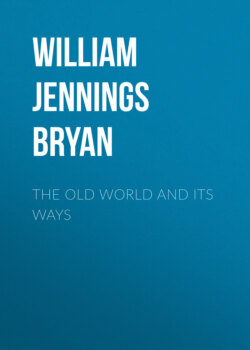Читать книгу The Old World and Its Ways - William Jennings Bryan - Страница 9
На сайте Литреса книга снята с продажи.
JAPANESE CUSTOMS AND HOSPITALITY.
ОглавлениеTable of Contents
Every nation has its customs, its way of doing things, and a nation's customs and ways are likely to be peculiar in proportion as the nation is isolated. In Japan, therefore, one would expect to see many strange things, and the expectation is more than realized. In some things their customs are exactly the opposite of ours. In writing they place their characters in vertical lines and move from right to left, while our letters are arranged on horizontal lines and read from left to right. Their books begin where ours end and end where ours begin. The Japanese carpenters pull the saw and plane toward them, while ours push them from them. The Japanese mounts his steed from the right, while the American mounts from the left; Japanese turn to the left, Americans to the right. Japanese write it "Smith John Mr.," while we say "Mr. John Smith." At dinners in Japan wine is served hot and soup cold, and the yard is generally at the back of the house instead of the front.
The Japanese wear white for mourning and often bury their dead in a sitting posture. The death is sometimes announced as occurring at the house when it actually occurred elsewhere, and the date of the death is fixed to suit the convenience of the family. This is partly due to the fact that the Japanese like to have the death appear as occurring at home. Sometimes funeral services are held over a part of the body. An American lady whose Japanese maid died while attending her mistress in the United States, reports an incident worth relating. The lady cabled her husband asking instructions in regard to the disposition of the body. He conferred with the family of the deceased and cabled back directing the wife to bring a lock of the hair and the false teeth of the departed. The instructions were followed and upon the delivery of these precious relics, they were interred with the usual ceremonies.
The handshake is uncommon even among Japanese politicians, except in their intercourse with foreigners. When Baron Komura returned from the peace conference in which he played so important a part, I was anxious to witness his landing, partly out of respect to the man and partly out of curiosity to see whether the threatened manifestations of disapproval would be made by the populace, it having been rumored that thousands of death lanterns were being prepared for a hostile parade. (It is needless to say that the threats did not materialize and that no expressions of disapproval were heard after his arrival.) I found it impossible to learn either the hour or the landing place, and, despairing of being present, started to visit a furniture factory to inspect some wood carving. Consul-General Jones of Dalney (near Port Arthur), then visiting in Yokohama, was my escort and, as good fortune would have it, we passed near the Detached Palace. Dr. Jones, hearing that the landing might be made there, obtained permission for us to await the peace commissioner's coming. We found Marquis Ito there and a half dozen other officials. As Baron Komura did not arrive for half an hour, it gave me the best opportunity that I could have had to become acquainted with the Marquis, who is the most influential man in Japan at present. He is President of the Privy Council of Elder Statesmen and is credited with being the most potent factor in the shaping of Japan's demands at Portsmouth.
